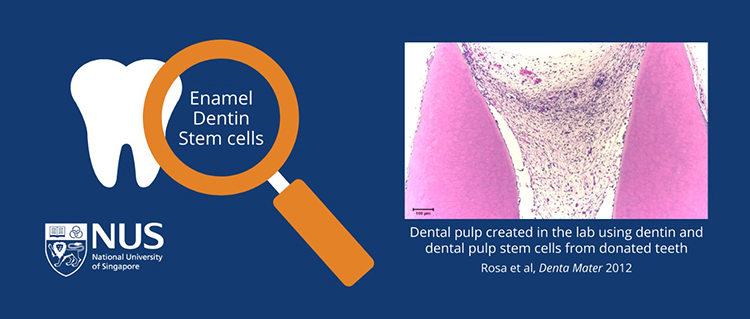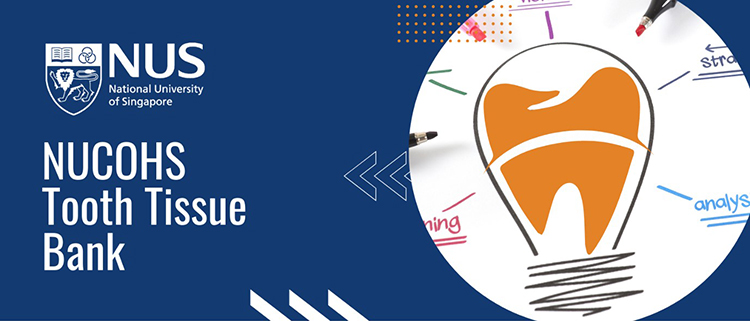News
NUCOHS Tooth Tissue Bank Opens in Singapore
The Faculty of Dentistry, National University of Singapore (NUS) in collaboration with the National University Centre for Oral Health, Singapore (NUCOHS) to set up the first tooth bank in Singapore, the NUCOHS Tooth Tissue Bank (NTTB). This is an enterprise that will facilitate research initiatives in an integrated academic health system.
Imagine that you're going to start on research and you need a hundred samples. You need to go to the clinics and find out a hundred patients that will undergo extractions and invite them to give you their teeth. At the end of the day, we would have gone through a laborious and time-consuming process just to get the project started,” explained A/P Vinicius Rosa, Vice Dean (Research).
The NTTB works to remove this process entirely by keeping a ready supply of donated extracted teeth before researchers even begin on their projects. Managed by the Faculty’s Clinical Research Unit (CRU), its clinical research coordinators actively approach NUCOHS patients scheduled for extractions to donate their extracted teeth to the bank. Standard tooth extractions would have the teeth discarded and incinerated as biomedical waste. This initiative offers an alternative to utilising the extracted teeth instead of discarding them, thus minimising biomedical waste and ensuring that every type of tooth is readily available for research. All tooth donations are voluntary, and donors’ privacy is ensured.
Developing the NTTB
Ms Choo Si Yi, the lead manager of the NTTB, was involved in the entire development of the first tooth bank in Singapore. According to Si Yi, the NTTB went through strict regulations so that the teeth donated are ethically stored and issued according to the Human Biomedical Research Act that regulates human biomedical research in Singapore.
“We had to go through multiple reviews on all the ethical documents, legal agreement and streamlining the operational processes before submitting it,” shared Si Yi.
NUCOHS receives as many as 30 patients undergoing tooth extractions daily. The continuous supply of extracted teeth by NUCOHS has helped the NTTB greatly and ensured a large variation of tooth-types that are suitable for research.
“CRU is glad to lead the set-up of the NTTB and is thankful for all the support from NUCOHS. With NTTB, biological materials are readily available for researchers to start their projects expeditiously. Thus, researchers will not need to worry about consent-taking, how to store the samples and the regulations as all these steps will be taken care of by our team,” added Si Yi.

Process from tooth collection to research.
Images: Flaticon.com
Such efforts by the CRU have made the NTTB successful in reducing the administrative and physical workload needed to acquire biological resources and increasing the agility for researchers to begin and complete their research.
“I experienced challenges in the past even when the resources to start the research were available, but we were still clearing the process to collect and dispense the teeth,” said A/P Rosa. "But after the tooth bank was set up, we have completed projects on time or even in a shorter time. We are eager to see more projects completed with the support from NTTB and celebrate more achievements in the future.”
Working with the NTTB
Dr. Chung Qi-Yan, a Master of Dental Surgery student at the Faculty of Dentistry, was the first to work with the NUCOHS Tooth Tissue Bank to support her master's thesis and she shares her experience working with NTTB.
"The criteria for my research project were quite specific so I was looking for samples with certain features. We would go through the samples and choose those that would fulfil the criteria for our study," said Chung. "If we had to go to each clinician individually for recruitment, the collection itself would take much longer before we could start the experiment itself."

Future of Biological Material Collection
With the success of the NTTB, A/P Rosa hopes to expand and collect other types of biological materials such as stem cells and biofilm in the future. In fact, the team is currently working to set up a stem cell bank, slated for operationalisation next year.
"There are a lot of potentials for us if biological materials are readily available when we start the research,” said A/P Rosa. “It allows people to aim for higher, more complex research that ultimately will benefit our patients and oral health globally."


